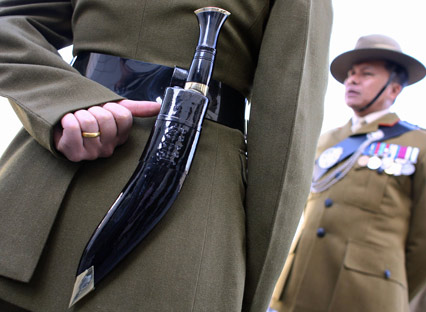What makes Gurkhas the toughest soldiers in the world?
Elite Nepalese troops chosen to protect milestone Trump-Kim summit in Singapore

A free daily email with the biggest news stories of the day – and the best features from TheWeek.com
You are now subscribed
Your newsletter sign-up was successful
The Gurkha warriors of Nepal have been in the international spotlight recently, after it was announced that they will provide security during this month’s summit between US President Donald Trump and North Korean leader Kim Jong Un in Singapore.
Singapore is one of several nations, including the UK, India and Brunei, whose security forces include a Gurkha contingent.
Who are the Gurkhas?
The Week
Escape your echo chamber. Get the facts behind the news, plus analysis from multiple perspectives.

Sign up for The Week's Free Newsletters
From our morning news briefing to a weekly Good News Newsletter, get the best of The Week delivered directly to your inbox.
From our morning news briefing to a weekly Good News Newsletter, get the best of The Week delivered directly to your inbox.
The term Gurkha refers specifically to inhabitants of the mountainous Gorkha region, an independent kingdom until the unification of Nepal in 1768.
The kukhri, a distinctive curved knife, is an important part of Gurkha culture, used both for work and in battle. Custom dictates that, in the hand of a warrior, “the khukri must draw blood every time it is unsheathed”, says The Kathmandu Post.
Where do they serve?
As well as serving in Nepal’s own national army, Gurkhas have formed part of the British Army since 1815, when they were recruited to help suppress uprisings in India. Around 3,600 Nepalese men currently serve in the British Army’s Brigade of Gurkhas.
A free daily email with the biggest news stories of the day – and the best features from TheWeek.com
More than 32,000 Gurkhas serve in seven regiments of the Indian Army, while Brunei’s all-Gurkha elite unit is charged with protecting the sultan and his family.
What makes them the best in the world?
First off, they are physically the best of the best. The 200-300 men who join the Brigade of Gurkhas every year from a pool of more than 20,000 applicants are the products of a a gruelling recruitment process.
“It culminates in the fearful ‘Doko race’,” former British Army officer Johnny Fenn wrote in The Daily Telegraph, “a five mile run, uphill, where the soldiers have to carry 25 kilograms in a basket on their backs that is attached only by a head-strap”.
Bravery, loyalty and honour are at the heart of Gurkha culture, as exemplified by their motto, which translates as “better to die than be a coward”.
One British soldier who came up against Gurkhas warriors during an ill-fated attempt to invade Nepal later wrote: “I never saw more steadiness or bravery exhibited in my life. Run they would not, and of death they seemed to have no fear.”
Since 1911, members of the Gurkha regiments have won 13 Victoria Cross medals for exceptional bravery.
With bravery also comes sacrifice. The Gurkha Welfare Trust estimates that at least 19,000 Gurkhas have lost their lives fighting for Britain, including more than 6,000 in the First World War and 9,000 in the Second World War.